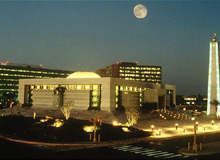
Saudi Aramco, a Saudi Arabia-based international petroleum company, constructed a 400,000 barrels-per-day (bpd) full-conversion refinery at Yanbu in 2016. Yanbu is an important Red Sea port in the Al Madinah province of Saudi Arabia.
The refinery is estimated to cost $12bn and is spread over 5.2 million square metres. It was opened in January 2016 and is the Saudi Aramco’s second refinery in Yanbu.
Saudi Aramco built another refinery in Jubail in partnership with Total in June 2014. The Yanbu and Jubail refineries process crude oil from the Manifa offshore field, which has a capacity of 500,000bpd. The field became operational in June 2014.
Aramco formed a joint venture, Yanbu Aramco Sinopec Refining Company (YASREF) with China Petroleum & Chemical Corporation (Sinopec) to develop and run the refinery.
Yanbu boost to Saudi refining capacity
The Yanbu refinery produces high-quality, ultra-low sulphur-refined products that satisfy existing and future US and European product specifications. As well as expanding Saudi Arabia’s refining capacity, the project provides refined products to domestic and international markets. The project attracts foreign investment, expand Saudi Arabia’s economy and create more job avenues for Saudis.
The Yanbu refinery is one of four refineries that Aramco plans to build in the near future. The refineries are expected to bolster the country’s domestic refining capacity from 2.1 million barrels per day to 3.8 million barrels per day. Heavy crude oil is not a feasible option for most importing nations because it is difficult to transport and expensive to refine.
The production of heavy crude oil increases as oil-producing fields in Saudi Arabia start to age. Saudi Arabia is, therefore, focusing on improving its refining capacities to ensure the flexibility of its export prices.
Yanbu refinery project background
Plans for building the Yanbu plant were originally announced in 2006 but were delayed due to uncertainties in the financial and contracting markets.
Saudi Aramco and ConocoPhillips signed an agreement in 2006 to develop and run the refinery. The agreement covered various aspects of the project, including its configuration and a wide range of important technical, commercial, legal and financial terms.
In April 2010, ConocoPhillips withdrew from the project in order to reduce its downstream activities and concentrate on petroleum exploration.
In March 2011, Aramco signed a memorandum of understanding (MoU) with Sinopec to develop the Yanbu refinery. According to the MoU, Aramco and Sinopec share equity interests of 62.5% and 37.5%, respectively, in the project.
The Yanbu refinery produces 90,000bpd of petrol, 263,000bpd of ultra-low sulphur diesel, 6.3 billion tonnes a year of coke, and 1.2 billion tonnes a day of sulphur.
Contractors involved with Saudi Aramco’s Yanbu refinery
The initial evaluation, front-end engineering and design of the Yanbu refinery project were carried out by Houston-based engineering and construction company KBR. In August 2009, KBR was also awarded the contract to provide engineering and procurement services for the project’s utility package, interconnecting systems and pipe racks.
Abdulrahman Al-Shalawi Establishment carried out site preparation works for the refinery.
In July 2010, Saudi Aramco awarded seven EPC contracts for the project. Spain’s Tecnicas Reunidas won the EPC contract for the coker unit.
The hydrocracker and petrol unit were built by South Korea’s Daelim Industrial and Seoul-based SK Engineering received the contract for the crude unit.
Dayim Punj Lloyd, a subsidiary of India’s Punj Lloyd, was responsible for building the Yanbu refinery’s offshore infrastructure and pipelines.
Punj Lloyd constructed a 36in-60in diameter steel pipeline that transports fuel gas, diesel, water, petrol and benzene. It also constructed 133.8in-114.1in diameter, reinforced thermosetting plastic pipelines to carry seawater, electrical and metering systems.
SNC-Lavalin received a two-year general engineering services (GES) contract from YASREF.



